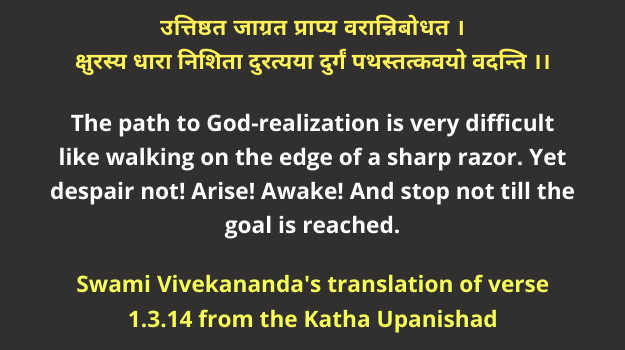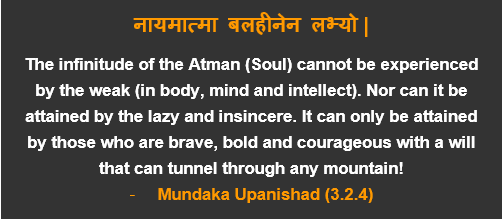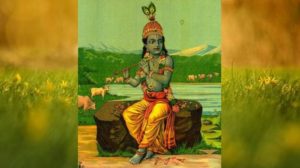It is a known fact that whenever a sadhak (spiritual aspirant) begins to walk on the road towards God-realization, he/she is often beset with tremendous challenges. These challenges strike at the sadhak from 2 opposite directions.

1. Outside Challenges
The first set of difficulties come from outside – from the materialistic world, in which all sadhaks by default, today have to live. Immersed in such a world, a sadhak faces the ever-present danger of falling off the spiritual path, by giving up the pursuit of high ideals such as integrity, honesty, courage, simplicity and truthfulness.
A cursory read of the daily newspaper, will quickly reveal to any sadhak that these values do not necessarily lead to any materially beneficial pay-offs. In fact if anything, in the times that we live in, they end up making life even more difficult and full of hardship.
It is a common observation that these days the most unscrupulous, corrupt and criminal elements of society, get to enjoy boundless power, prestige, wealth and material comforts. Witnessing this topsy-turvy state of world affairs, a sadhak may feel tempted to give up all the hard earned spiritual gains – to give up his/her ascent to a higher consciousness and instead join in with the flow of the morally-bankrupt.
Another major flank on which the outside worldly pressurizes the sadhak is the domestic front. Many times spouses, parents, siblings and other well-meaning relatives strongly dissuade an aspirant from pursuing the spiritual path. Such a mismatch between material vs. spiritual aspirations within a family, lead to frequent fights and unsettling disagreements vitiating the atmosphere at home.
However as the Katha Upanishad has stated in the verse above, the thing to remember is that on the spiritual path these challenges are to be expected, and when they come, they must be dealt with bravely. No sadhak should feel alone in their struggles because even the Avatars and God-realized souls who have walked the path before us, have battled similar if not worse difficulties.
For example, Shriram Sharma Acharya faced tremendous flak from his relatives, when at the tender age of 15, after a life-transforming encounter with his guru, he decided to give up earning a livelihood through the family profession of priesthood – and instead began to lead the life of a renunciate, practicing tremendous austerities such as eating only jowar rotis and buttermilk for 24 years, all the while performing intense Gayatri Sadhana (mantra japa and meditation).
Similarly, at Dakshineshwar, Sri Ramakrishna used to frequently be immersed in Bhava-Samadhi, during which he conversed with the Divine Mother Kali, face-to-face. But worldly-minded people could not fathom this exalted state of his mind and therefore called him “mad”. They harassed him in numerous ways and even tried to get him evicted from the Dakshineshwar temple.
Swami Vivekananda also had to face the wrath of the misguided. After attaining much fame in the West, Swamiji faced vitriolic attacks not only from jealous Indians, but from American missionaries as well, whose “un-Christ-like” activities he had courageously exposed. Sri Aurobindo too was not left untouched. During India’s freedom struggle, he was heavily persecuted by the British who tried every possible trick, including the charge of sedition to jail him. Ultimately Sri Aurobindo had to live in exile in Pondicherry to pursue his Sadhana.
2. Inside Challenges
Now as if these challenges from the outside were not enough, a sadhak has to face a second onslaught of even more daunting difficulties which arise from the inside – from his/her own mind.
This is because whenever a sadhak sets off on the spiritual path, first and foremost he/she has to put in tremendous effort to overcome mental laziness and inertia, and establish a regimented pattern of japa and meditation. Then in order to meditate successfully, the sadhak has to further exert and curb his/her mind’s natural tendency to flit like a butterfly from one thought to another. The constant jumble of thoughts has to be controlled and all thoughts have to be made to flow with devotion and faith in one direction only – and that is towards God.
However as most people would have experienced this is extremely difficult to do. In fact steady and deep meditation is possible only after substantial effort has been expended towards controlling one’s thoughts at all times and under all life circumstances, and not just when one is sitting down to meditate.
To gain such a firm control over one’s mind, one has to necessarily observe strict self-control in all daily activities. At every possible moment a sadhak has to remain vigilant and practice hard to stop his/her mind from flowing along the natural channels of anger, lust for sex/sexual thoughts, passion for food, greed for wealth and power, fulfilment of egotistical desires, moods of fear, despair and despondency etc. Only when the mind has been brought under such a strict control that no adverse (or happy) situation of life can disturb its calmness, only when the turbulence of thoughts is thus stilled – only then is the deep meditation of Samadhi possible.
It is in view of these immense external and internal challenges that lie on the road to God-realization, that the Rishis have cautioned that traversing the spiritual path is as difficult as walking on a razor’s edge. At every step tremendous difficulties abound. At any moment the sadhak faces the risk of getting overwhelmed by them and falling off the path.
And it is for this same reason that the Mundaka Upanishad has further emphasized that – the path of spirituality is not for the weak, but for the brave and the strong willed; because only such people are equipped to overcome all odds and reach the door of their Atman and realize its oneness with Brahman (God) – the infinite Consciousness.
“Practise hard; whether you live or die does not matter. If you are brave enough, in six months you will be a perfect Yogi. To succeed, you must have tremendous perseverance, tremendous will. “I will drink the ocean,” says the persevering soul, “at my will mountains will crumble up. Have that sort of energy, that sort of will, work hard, and you will reach the goal.”
– Swami Vivekananda









